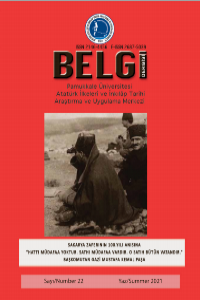Abstract
Kamuoyu (efkâr-ı umûmiye) genel olarak; belli bir zamanda, tartışmalı sorun karşısında, bu sorunla ilgilenen kişiler grubuna veya gruplarına hakim olan kanaat şeklinde tanımlanır. Bu tanıma göre kamuoyu, çoğunluk tarafından desteklenen görüşleri içermektedir. Diğer bir tanıma göre kamuoyu; hükümet dışı özel çevrelerden hükümete doğru yönelen ve hükümetçe göz önünde bulundurulması doğru olan kanaatlerdir. Yani, kamuoyu bir siyasal katılma türüdür.
Osmanlı İmparatoruğu, dört yıl süren harbin sonunda dağılmış ve küllerinden yeni bir Cumhuriyet doğmuştur. İmparatorluğu yok olmaya götüren bozgundan sonra Almanya ile beraber harbe girme sorumluluğu imparatorluğun son yıllarında yönetimde bulunan bir avuç idareciye yüklenegelmiştir. Özellikle de Enver, Cemal ve Talat Paşalar sorumlu olarak görülmüştür. Karar verici makamlarda bulunan bu şahısların siyasî sorumluluğu inkar edilemez. Ancak bir devleti yok olmaya götüren bu kadar büyük bir kararın yalnızca birkaç kişinin eseri olduğuna inanmak mümkün müdür? Bu idarecileri Alman ittifakı ve harbe giriş yönünde etkileyen bir kamuoyu olmuş mudur? Böyle bir kamuoyu oluşmuş ise kamuoyunu şekillendiren faktörler nelerdir?
Harbin başladığı döneme ait şahitlikler, yöneticilerin harp yanlısı tutumunda yalnız olmadığını ortaya koymaktadır. Yani Osmanlı kamuoyunun genel olarak harp lehinde şekillendiği söylenebilir. Osmanlı kamuoyunun şekillenmesinde II. Meşrutiyet’ten itibaren faaliyete başlayan Türk Ocağı, Donanma Cemiyeti, Müdafaa-i Milliye Cemiyeti gibi milliyetçi örgütlerin önemli etkisi olmuştur. Balkan Harbi’yle beraber milliyetçi propaganda hız kazanmış ve etkisini artırmıştır. Balkan Harbi’nin neden olduğu felaketler Osmanlı toplumunda gayrimüslimler ile Müslümanlar arasında derin bir uçurum açmıştır. Nitekim, Balkanların kaybedilmesiyle ile Osmanlıcılık siyaseti iflas etmiş, Türkçülükten Turancılığa uzanan milliyetçi akımın önü açılmıştır. Özellikle Ağustos-Kasım 1914 tarihleri arasında, Turancı-Panislamist söylemli yoğun bir savaş propagandası yürütülmüştür. Bu propaganda özellikle eğitimli genç kuşak üzerinde etkili olmuştur. Bu koşullarda harp haklı, meşru ve gerekli görülmüştür.
Keywords
Thanks
Kolaylıklar dilerim
References
- Adıvar, Halide Edip(1955), Türkiye’de Şark, Garp ve Amerikan Tesirleri, İstanbul.
- Aganoglu, H.Yıldırım(2001), Osmanlı'dan Cumhuriyet'e Balkanlar'ın Makus Talihi Göç, Kum Saati Yayınları, İstanbul.
- Ahmad, Feroz(2013), İttihat ve Terakki (1908-1914), Kaynak Yayınları, İstanbul.
- Akşin, Sina(2011), Jön Türkler ve İttihat ve Terakki, İmge Kitabevi, Ankara.
- Apak, Rahmi(1988), Yetmişlik Bir Subayın Hatıraları, Türk Tarih Kurumu Basımevi, Ankara.
Abstract
In general, public opinion is defined as the prevailing opinion shared among a group or groups which dealing with a raising issue at a certain time. According to this definition, public opnion includes opinions which supported by the majority. As for other definition, public opinion is the opinions that is directed by different communities towards governments and required to be considered by those governments. So, public opnion is a sort of political participation.
Ottoman Empire was destroyed after a four-years war, and then the Republic was founded. The responsibility of entering the war on the side of Germany after the defeat, which caused the end of empire, was attributed to a handful of administrators. Especially Enver, Cemal and Talat Pashas were held responsible for this rout. The responsibility of these persons, who were in the dominant position in decision-making, could not be denied. But, is it possible to believe that just the decisions of these persons caused the end of the empire? Was there any public opinion behind the decision of entering war on the side of Germany which affected these administrators? If yes, what were the factors shaping the public opinion?
The witnesses from the period, when the war began, showed that the administrators were not alone in terms of their pro-war attitude. It can be said that the Ottoman public opinion was generally shaped in favor of the war. In this regard, it seems that some nationalist organizations and groups such as Türk Ocağı (Turkish Society), Donanma Cemiyeti (Armada Society), Müdafaa-i Milliye Cemiyeti, were effective in shaping public opnion. Among with the Balkan War nationalist propagandas increased it’s influence and the disasters, which caused by the Balkan War, have opened a deep gap between muslims and non-muslims. In fact, Ottomanism failed after the Balkan War and the nationalist movemet, which expanding from Turkism to Turanism, has gained momentum. Particulary, Turanist and Pan- Islamist war propaganda was densely carried during August- November in 1914, which had a wide impact upon the young generation at that time. Under these circumstances, war was seen as legitimate and necessary alternative.
Keywords
References
- Adıvar, Halide Edip(1955), Türkiye’de Şark, Garp ve Amerikan Tesirleri, İstanbul.
- Aganoglu, H.Yıldırım(2001), Osmanlı'dan Cumhuriyet'e Balkanlar'ın Makus Talihi Göç, Kum Saati Yayınları, İstanbul.
- Ahmad, Feroz(2013), İttihat ve Terakki (1908-1914), Kaynak Yayınları, İstanbul.
- Akşin, Sina(2011), Jön Türkler ve İttihat ve Terakki, İmge Kitabevi, Ankara.
- Apak, Rahmi(1988), Yetmişlik Bir Subayın Hatıraları, Türk Tarih Kurumu Basımevi, Ankara.
Details
| Primary Language | Turkish |
|---|---|
| Journal Section | Research Article |
| Authors | |
| Publication Date | July 1, 2021 |
| Submission Date | April 21, 2021 |
| Acceptance Date | June 15, 2021 |
| Published in Issue | Year 2021 Issue: 22 |


